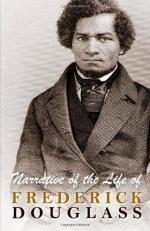and of all men, adopted slaveholders are the worst.
He was cruel, but cowardly. He commanded without
firmness. In the enforcement of his rules, he
was at times rigid, and at times lax. At times,
he spoke to his slaves with the firmness of Napoleon
and the fury of a demon; at other times, he might
well be mistaken for an inquirer who had lost his
way. He did nothing of himself. He might
have passed for a lion, but for his ears. In
all things noble which he attempted, his own meanness
shone most conspicuous. His airs, words, and actions,
were the airs, words, and actions of born slaveholders,
and, being assumed, were awkward enough. He was
not even a good imitator. He possessed all the
disposition to deceive, but wanted the power.
Having no resources within himself, he was compelled
to be the copyist of many, and being such, he was
forever the victim of inconsistency; and of consequence
he was an object of contempt, and was held as such
even by his slaves. The luxury of having slaves
of his own to wait upon him was something new and
unprepared for. He was a slaveholder without the
ability to hold slaves. He found himself incapable
of managing his slaves either by force, fear, or fraud.
We seldom called him “master;” we generally
called him “Captain Auld,” and were hardly
disposed to title him at all. I doubt not that
our conduct had much to do with making him appear awkward,
and of consequence fretful. Our want of reverence
for him must have perplexed him greatly. He wished
to have us call him master, but lacked the firmness
necessary to command us to do so. His wife used
to insist upon our calling him so, but to no purpose.
In August, 1832, my master attended a Methodist camp-meeting
held in the Bay-side, Talbot county, and there experienced
religion. I indulged a faint hope that his conversion
would lead him to emancipate his slaves, and that,
if he did not do this, it would, at any rate, make
him more kind and humane. I was disappointed
in both these respects. It neither made him to
be humane to his slaves, nor to emancipate them.
If it had any effect on his character, it made him
more cruel and hateful in all his ways; for I believe
him to have been a much worse man after his conversion
than before. Prior to his conversion, he relied
upon his own depravity to shield and sustain him in
his savage barbarity; but after his conversion, he
found religious sanction and support for his slaveholding
cruelty. He made the greatest pretensions to piety.
His house was the house of prayer. He prayed
morning, noon, and night. He very soon distinguished
himself among his brethren, and was soon made a class-leader
and exhorter. His activity in revivals was great,
and he proved himself an instrument in the hands of
the church in converting many souls. His house
was the preachers’ home. They used to take
great pleasure in coming there to put up; for while
he starved us, he stuffed them. We have had three
or four preachers there at a time. The names




